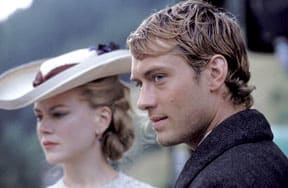In Cold Mountain, director Anthony Minghella once again succeeds at adapting a difficult novel for the screen. Having previous tackled The English Patient and The Talented Mr. Ripley, Minghella successfully brings Charles Frazier's novel to the screen, at the same time echoing his own distant-love success with English Patient.
Like his adaptation of Michael Ondaatje's novel, with Cold Mountain, Minghella faces a serious challenge: the core of its romance, between a Civil War soldier (Jude Law) and a well-born noblewoman fallen on hard times (Nicole Kidman), takes place after only a few scenes together. The rest of the film then sustains itself on the momentum of that early spark, as Law's war deserter journeys back home while Kidman's prissy educated self learns self-sufficiency on her farm.
The too-beautiful pair of Law and Kidman could have been a serious distraction in a gritty period film like Mountain, but Minghella wisely stuffs his film with a remarkable supporting cast that provides the foundation for his two stars to rise above. Renee Zellweger is notably strong as a tough farmer who befriends Kidman; Zellweger's father, played by Brendan Gleeson, Natalie Portman as an abandoned widow, and Philip Seymore Hoffman as a disgraced priest all provide important, human beats to this occasionally ponderous story.
The level of detail brought to the project is what really allows it to take off although filmed in Romania, Minghella has a strong sense of the hardship, starvation and small-scale political squabbles that dominated this conflicted period in American life. And surprisingly, it's all maintained through the film's near-two-and-a-half hour running time without feeling like we're just waiting for the film's star-crossed lovers to reunite. (Alliance Atlantis)
Like his adaptation of Michael Ondaatje's novel, with Cold Mountain, Minghella faces a serious challenge: the core of its romance, between a Civil War soldier (Jude Law) and a well-born noblewoman fallen on hard times (Nicole Kidman), takes place after only a few scenes together. The rest of the film then sustains itself on the momentum of that early spark, as Law's war deserter journeys back home while Kidman's prissy educated self learns self-sufficiency on her farm.
The too-beautiful pair of Law and Kidman could have been a serious distraction in a gritty period film like Mountain, but Minghella wisely stuffs his film with a remarkable supporting cast that provides the foundation for his two stars to rise above. Renee Zellweger is notably strong as a tough farmer who befriends Kidman; Zellweger's father, played by Brendan Gleeson, Natalie Portman as an abandoned widow, and Philip Seymore Hoffman as a disgraced priest all provide important, human beats to this occasionally ponderous story.
The level of detail brought to the project is what really allows it to take off although filmed in Romania, Minghella has a strong sense of the hardship, starvation and small-scale political squabbles that dominated this conflicted period in American life. And surprisingly, it's all maintained through the film's near-two-and-a-half hour running time without feeling like we're just waiting for the film's star-crossed lovers to reunite. (Alliance Atlantis)




